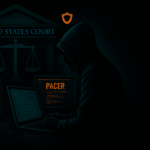Hackers Breach Federal Court Filing System: What It Means for You
Introduction
Imagine being a confidential informant in a federal criminal case — and suddenly realizing your name might now be in the hands of the very people you helped put away. That’s the nightmare scenario federal officials are dealing with after a sweeping cyberattack on the U.S. federal judiciary’s electronic case filing system.
The hack, first detected around July 4, 2025, affected PACER (Public Access to Court Electronic Records) and CM/ECF (Case Management/Electronic Case Files). Together, these systems store, process, and share millions of legal filings, including highly sensitive information from across the country.
Does that include any of your data?
Why This Breach Matters
First, what data might the attackers have accessed because of the attack?
- Identities of confidential informants, which potentially puts lives at risk.
- Sensitive evidence files that could compromise ongoing investigations.
- Sealed indictments and warrants, potentially alerting suspects before law enforcement can act.
To put the problem into context, PACER and CM/ECF are not small, niche tools. They allow attorneys, judges, and court staff to manage their case files. A breach like this isn’t just an IT problem; it’s a direct threat to the integrity of the legal process.
How Did It Happen?
While authorities have not yet disclosed the exact intrusion method, we do know that these systems are extremely old. Federal judiciary officials have long warned that PACER and CM/ECF are outdated and unsustainable, describing the cyber risks as “unrelenting” and of “extraordinary gravity.”
When you combine legacy technology with nation-state-level attackers or organized cybercrime groups, it creates a dangerous mix. Right now, investigators haven’t ruled out either possibility.
In the meantime, the Administrative Office of the U.S. Courts, Justice Department, and FBI are all involved in assessing the damage. District courts nationwide are also reviewing their own cases for possible exposure.
Takeaways From This Cyber-Incident
You don’t have to join the legal profession to feel the impact, or to learn from the attack on the federal court filing system. If you’re in any profession handling sensitive or high-stakes data, you can take away a few core lessons.
- Don’t rely on outdated systems. If your tools are no longer supported or updated, they’re vulnerable.
- Encrypt sensitive data, especially before uploading or sharing it.
- Use multi-factor authentication, even for internal case systems.
- Have an incident response plan and rehearse it before you need it.
Cyberattacks don’t just target money or trade secrets. They target trust, safety, and the rule of law itself. If the systems that keep justice running aren’t secure, nobody’s data is truly safe.
Long-Term Effects on Everyone
Unfortunately, here’s the hard truth: Even after an extensive investigation, the full scope of a breach like this can take months, and sometimes years, to uncover. That delay isn’t just an abstract problem; if your name or details appear in a federal court filing, they could now be floating around the dark web before you even realize it.
That might mean criminals impersonating you to access financial accounts, scammers using leaked legal documents to make phishing attempts sound more convincing, or your private legal disputes becoming public knowledge.
How to Protect Yourself and Your Data
Take these precautions to limit fallout from any major data breach, including this one:
- Freeze your credit with all three major bureaus (Experian, TransUnion, Equifax) to stop new accounts in your name.
- Use unique passwords for each account, and enable multi-factor authentication wherever possible.
- Monitor your accounts and credit reports regularly for suspicious activity.
- Be cautious of legal-themed phishing. If you get an email or call claiming to be from a court or law enforcement, verify it through official channels before responding.
When threat actors breach large government systems, like the federal court e-filing system, the ripple effects can touch far more people than just those directly involved in the cases. Staying proactive is still your best defense!
The post Hackers Breach Federal Court Filing System: What It Means for You appeared first on Cybersafe.


